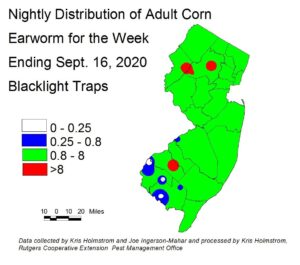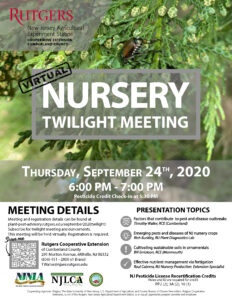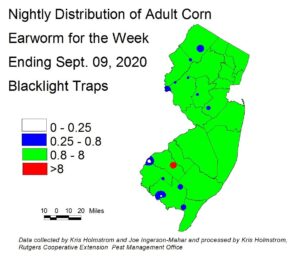Sweet Corn
Fall armyworm (FAW) larval infestations remain at low levels in the few remaining sweet corn plantings not yet silking. At this point in the season, FAW shouldn’t become a widespread economic problem. However, growers should be alert to the possibility of infestations on the last of their late plantings. Injury from newly hatched larvae shows up as “window panes” or areas where leaf tissue has been eaten down the the lower epidermis. This injury leads down into the whorl. As larvae gain size, they begin to consume leaf tissue in its’ entirety, creating ragged holes and lots of droppings. FAW can be tough to manage because it is resistant to synthetic pyrethroid insecticides (IRAC 3A) and because larvae are often covered by their own droppings, making contact with the insecticide more difficult. Treat when 12% or more plants exhibit FAW injury alone, or in combination with ECB injury.
 Corn earworm (CEW) moth captures continued a gradual decline over this past week due to several nights with low temperatures. The decline is less noticeable in the northern counties, where CEW blacklight catches had been quite high prior to the onset of cooler weather. Therefore the weekly averages there are higher. Overall, these catches are representative of lower adult activity, and growers should consider this pest to still be at moderately high population levels in the state. The current population poses a significant risk to silking corn. The reduction in CEW catch was not enough to substantially change this weeks map from last week (see map at left). Green areas on this map representing a 3-day spray schedule. For further information on CEW activity, see pheromone trap information below.
Corn earworm (CEW) moth captures continued a gradual decline over this past week due to several nights with low temperatures. The decline is less noticeable in the northern counties, where CEW blacklight catches had been quite high prior to the onset of cooler weather. Therefore the weekly averages there are higher. Overall, these catches are representative of lower adult activity, and growers should consider this pest to still be at moderately high population levels in the state. The current population poses a significant risk to silking corn. The reduction in CEW catch was not enough to substantially change this weeks map from last week (see map at left). Green areas on this map representing a 3-day spray schedule. For further information on CEW activity, see pheromone trap information below.
The highest nightly trap catches of CEW in black light traps for the week ending 9/16/20 are as follows:
| Hackettstown 19 | Morristown 8 | Port Colden 6 |
| Long Valley 16 | Allamuchy 7 | Princeton 6 |
| Denville 13 | Sereantsville 7 | Blairstown 5 |
| Chester 9 | Downer 6 | Hillsborough 5 |
 Thursday, September 24th, 2020
Thursday, September 24th, 2020
